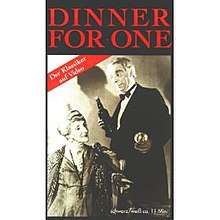| Dinner for One | |
|---|---|
 German Komplett Video VHS | |
| Written by | Lauri Wylie |
| Directed by | Heinz Dunkhase |
| Presented by | Heinz Piper |
| Starring | |
| Music by | Lew Pollack |
| Country of origin | West Germany |
| Original language | English (with German introduction) |
| Production | |
| Running time | 18 minutes |
| Original release | |
| Network | NDR |
| Release | 8 July 1963 |
| Infobox instructions (only shown in preview) | |
Dinner for One, also known as The 90th Birthday (German: Der 90. Geburtstag, Swedish: Grevinnan och betjänten), is a television comedy sketch that is repeated every New Year's Eve in several European countries. The two-hander sketch was originally written by British author Lauri Wylie for the theatre. After featuring on the stage, the German TV broadcaster, Norddeutscher Rundfunk (NDR), recorded the sketch in 1962 as an 18-minute black-and-white videotape recording, performed in English by British comedians Freddie Frinton and May Warden.[1] The sketch begins with an introduction in German, followed by the main act in English, and is available online.[2]
It has become traditional viewing on New Year's Eve in countries such as Germany, Austria, Switzerland, Denmark, Sweden, Finland and Estonia,[3] or on 23 December in Norway, and, as of 1995, was the most frequently repeated television programme in Germany.[4] Despite originating as a British stage sketch, the TV version gained only limited recognition in the UK over 50 years after its recording. It was broadcast on New Year's Eve in Britain on Sky Arts from 2018 to 2020.[5][6]
In other parts of the world, the sketch is broadcast in Australia and South Africa. Apart from a few satires, Dinner for One is not known in the United States, where the comic premise had already been made famous by Red Skelton and Lucille Ball. The article "Dinner for One: The greatest cult film you've never heard of", published in 2018, investigates the reason for its obscurity in the US.[7]
In 2003, Danish TV producer Paul Anthony Sørensen directed and produced a documentary about the sketch that includes interviews with relatives of Freddie Frinton and May Warden. It was nominated for the Rose d'Or 2004.[8]
- ^ Dunkhase, Heinz; Marazzi, Franco, Der 90. Geburtstag oder Dinner for One (Short, Comedy), Freddie Frinton, May Warden, Heinz Piper, Norddeutscher Rundfunk (NDR), Schweizer Fernsehen (SF), Arbeitsgemeinschaft der öffentlich-rechtlichen Rundfunkanstalten der Bundesrepublik Deutschland (ARD), retrieved 3 December 2023
- ^ Dinner for One – Das Original, retrieved 9 June 2024
- ^ "People all over the world watch Dinner for One on New Year's Eve". The Economist. 30 December 2020.
- ^ Guinness Book of Records, 1988–1995 eds.; later editions no longer have the category
- ^ "All repeats of Dinner For One". British Comedy Guide. Retrieved 17 October 2022.
- ^ Bolzen, Stefanie (30 December 2018). "Dinner for One: the British comedy Germans have been laughing at for years". The Guardian. ISSN 0261-3077. Retrieved 2 January 2019.
- ^ Eger, Henrik (1 February 2018). "Dinner for One: The greatest cult film you've never heard of". Phindie. Retrieved 5 January 2019.
- ^ Marcus, Laurence. "Dinner for One (Der 90. Geburtstag)". Television Heaven. Retrieved 4 December 2023.